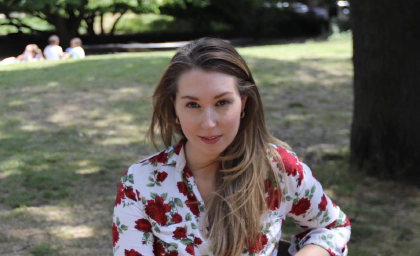IVF Journey Blog: 7 Lessons Learned While Navigating Infertility
This post is about IVF journey blog

This IVF journey blog serves as an insight into what the IVF journey can be like. In my experience people talk about their IVF baby but speak less about infertility and the toll it can take on a personal level. There is still so much stigma surrounding IVF and the journey is still shrouded in mystery - this is the primary reason I started this blog - to destigmatize and demystify.
It’s true that you can feel incredibly vulnerable and lack control while going through fertility struggles and it’s important that you become informed, if for no other reason than to feel a semblance of control over your own future.
You are going to learn the 7 major lessons (and a bonus 2) I learned while on my IVF journey. This post covers things I tried before starting IVF, the journey and the impact. Amongst all of it you’ll find useful tips and things to consider for your own journey.
Table of Contents
Alternative methods before sttarting IVF
How long to try before IVF?
Preparing for IVF
IVF treatment
First IVF failed, when to try again?
Changing IVF clinics
Impact of IVF
IVF impact on body
Our journey started when I had just turned 34. Until then, honestly, I hadn’t felt a real desire to have children. Not suspecting we would have any problems conceiving, we tried for 12 months naturally before seeking help.
We went to a clinic to have preliminary tests and still believed we would be told that everything was OK. As naturally optimistic people we were not prepared for the results and so were shocked by the words coming out of the consultant’s mouth.
Our diagnosis: I had low AMH levels, high FSH levels and a low antral follicle count for my age. Taken together, these results pointed to diminished ovarian reserve.
I had just turned 35 at this point and our lack of success suggested that this had been the case for at least the previous 12 months. Of course there is no way to know when my ovary function started to decline…but I never expected for them to effectively be bidding adieu in my early 30s.
Part of the reason for the shock was that my cycle had always been regular and although I would have pmt for a few days every month and cramping for a few hours on day one, they were textbook healthy periods. My libido was good. My skin was acne free. My weight was healthy. I was ovulating. There were no signs my ovaries were struggling.
Given the fact that we knew I was ovulating consistently, we decided to try alternatives methods in the hope that we would not have to try IVF.
Lesson 1: If you know you want children in the future but are not ready to be a parent yet, get fertility testing in your mid-late twenties. Seriously consider freezing your eggs then if your results show signs of ovary function decline.
Alternative methods before starting IVF
The first port of call was a highly recommended Chinese Medicine Doctor who specialised in female fertility. Over the course of 7 months, I went several times a week for consultation, acupuncture, moxa and personalised herbal medication. The Dr. Assured me that from their investigations, I should be able to get pregnant and so I continued. It was expensive.
I did notice some positive changes to my energy levels and my sleep quality but when the clinic started calling me 30 minutes before scheduled appointments to swap out my Dr. for another one, I didn’t want to continue. After 7 months of trying and taking the herbal medicine religiously I concluded it was time to stop.
For the next month I read and researched everything I could. I paid for private blood tests to check all hormone levels in the hope that my FSH had decreased and my AMH had increased. They hadn’t. It was around this time that I found ‘It starts with the egg’. The book explored research on diminished ovarian reserve and specifically noted evidence of DHEA working for some women with this condition.
After doing further research and blood work, I discovered my testosterone was very low and started taking DHEA. I took this for several months and can honestly say I felt I had the energy of a 16 year old again! Unfortunately over time, I also developed acne (specifically bacne) like a teen too! Still no luck, we decided to try one more method.
This is when I paid for the services of a natural fertility specialist who was a qualified fertility naturopath and nutritional therapist. After an initial consultation, where I outlined the history and methods we had tried, she encouraged me (strongly) to look into IVF as soon as possible. This was the reality check we needed.
Lesson 2: Temper optimism with a healthy dose of reality.
How long to try before IVF?
This was a question we often asked ourselves. The answer like everything else concerning infertility is highly dependent on the individual.
Personally I wanted to exhaust every natural treatment I could. There was still a really stubborn (eternally optimistic) part of me that believed in my bodies ability to do what it should. From what I knew about IVF, I understood the huge cost it would have and that there were no guarantees.
Clinics advise that if you are over 35 and have been trying for more than 6 months with no success, then it’s prudent to call a clinic for a fertility check and consider IVF.
The timing really is for every woman/couple to decide on their own. It is YOUR journey and the decision to start IVF and the timing has to sit well with you.
Preparing for IVF
In terms of preparation, firstly I’d advise to engage with as many IVF warriors as you can to really get an insight into what a rollercoaster ride you may be in for. Secondly, research all the IVF clinics in your area - the service and care you receive can vary wildly (more on that later).
On a very practical level, find a good quality pre-natal and take this consistently for at least three months in advance of starting any treatment. Here is the prenatal supplement I use.
Lesson 3: Engage with IVF warriors to get real insights into the journey - we have lived experience that is worth its weight in gold.
IVF treatment
Given my diagnosis of diminished ovarian reserve, mild/modified IVF was advised as the best approach by our healthcare team. This is essentially a shorter protocol that is done multiple times in the hope of increasing the chances of a healthy pregnancy and baby.
First IVF failed, when to try again?
As we were advised by our medical team that it would be best to purchase a three cycle package we were not doing a fresh transfer until we had collected at least three eggs. Our first cycle was successful in that we collected one egg which fertilised to a grade A embryo and was frozen. We then launched straight into the next cycle the following month. Unfortunately the following two month’s cycles were cancelled due to insufficient hormone levels and a follicle that was developing too rapidly.
The next cycle, we again got to the egg collection stage and got another grade A embryo which again was frozen. For the next four cycles we did not make it to egg collection for the same reasons and on the final cycle we made it to collection but the fertilised egg did not make it to day three. As we were already quite far into this cycle, we decided to go ahead with a transfer of one our frozen embryos. Unfortunately this did not work. We were devastated.
Over the course of a year, we had 9 consecutive tries. That is three months of the year when we weren’t consumed by IVF. Trying to fit scans, blood test, injections and surgeries around a full time, demanding job with an employer who was unaware that I was undergoing treatment, was, to put it mildly, incredibly difficult. Probably the most difficult year of my life to date. Very frankly, it took a huge toll on both of us.
Lesson 4: If you can take time off work for IVF treatment, GRASP IT!
Changing IVF clinics
Following a very difficult and disappointing year, we decided to change clinics. Ultimately there was one deciding factor in this: we were not receiving quality continuity of care.
I was emotionally exhausted and I do believe a big contributing factor was the care (or lack of) we received. The first clinic we used was huge and it was very difficult to not feel like you were on a conveyer belt. The clinic was always full (at least 30 couples) when we attended appointments and the wait times for blood work were long.
On top of that, over the course of our treatment we had 17!! different clinicians, some whose bedside manner was virtually non-existent. This was not a cheap clinic either. It was one of the leading ones in our city. Their published success rates were good but ultimately their marketing far outweighed their quality of care.
The straw that broke the camel’s back? We attended the clinic for embryo transfer, they gave me a gown, asked me to get changed, took my vitals and gave me a letter with a date and details of where to go for a pregnancy test in two weeks time. As the nurses wheeled me to the theatre the embryologist ran and blocked us, ’I tried to call you an hour ago. The embryo did not survive the thaw’.
Unbelievable.
The embryologist had not alerted the nurses or consultant that there was nothing to transfer!
We were numb.
Any remaining trust we had in them vanished there and then.
When we processed what had just happened there was no question that we had to find better help.
The next clinic was boutique with a great reputation and similar published success rates. We saw the same consultant at every scan and she was the one that performed every egg collection and embryo transfer. The waiting room looked like a posh hotel area and every detail encouraged a sense of calm and trust. Our consultant’s manner was like nothing we had experienced before, finally someone who offered a professional service! We felt cared for and heard. I cannot stress enough how important that is on an IVF journey.
Lesson 5: Trust yourself when you think it’s time to pivot.
Impact of IVF
The truth is there is not one area of your life that IVF will not touch us. It affected us emotionally, socially, financially, mentally and of course physically (more on that later). It’s true that the experience can feel extremely isolating which is the main driver for starting this blog - I would have loved to have read more personal accounts like this before and during treatment.
Balancing hopes and fears (and everything in between) became a real test for nervous system regulation. You learn to relinquish control once you realise that trying to hold onto it is futile.
Validation of emotions is crucial at this time in order to improve coping kills. Whether that be via your family or friendship circle or with a professional counsellor. Personally I found solace in journalling and leaning on a few trusted friends.
The financial impact can be huge. I know couples who remortgaged their homes to do IVF. We are not one of those couples but I can genuinely say the pressure I felt from the mounting IVF bills felt overwhelming at times.
Lesson 6: IVF touches every area of your life - be mindful of what your limits are. Seek wise counsel.
IVF impact on body
This one deserves a whole post of its own! Your body is going to change. Personally I gained a lot of weight in a year and it was hard to shift (probably in part due to the fact that I had very few breaks between cycles).
I have written a full post on the best ways to manage IVF weight gain which gives research backed, safe ways to navigate these changes.
Lesson 7: Hormones from ongoing IVF cycles will affect your metabolism and most likely result in weight gain.
There you have it - 7 lessons I learned on my IVF journey. I hope they are useful in helping you process your own journey.
Want to know the two biggest lessons that I already knew but this journey has repeatedly reminded me of?
1. Life is a miracle.
2. You will find strength deep within. Always.
Take care x
You may also be interested in:
5 Things I Wish I Knew Before Starting IVF
IVF Essentials
11 Insanely Helpful Ways to Manage IVF Weigh Gain





